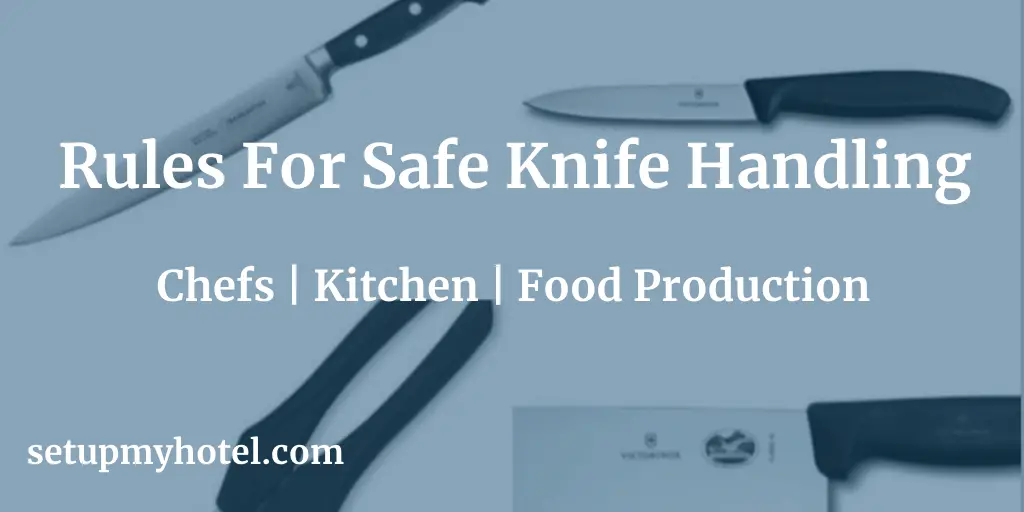How to properly handle the knife in the hotel kitchen?
The knife is considered by chefs as their most valuable and versatile tool in the kitchen. It is a toll with respect and when handled properly by an individual proficient in its use, can appear to be a thing of wonder.
Proper knife handling is crucial in a hotel kitchen to ensure safety, efficiency, and precision in food preparation. Here are some essential tips for handling knives in a hotel kitchen:
1. Choose the Right Knife:
- Select the appropriate knife for the task at hand. Different knives are designed for specific purposes, such as chef’s knives for general chopping, paring knives for precise tasks, and boning knives for meat.
2. Maintain Sharpness:
- A sharp knife is safer than a dull one. Regularly sharpen and hone your knives to ensure they are in optimal condition. Dull knives can slip and are more likely to cause accidents.
3. Proper Grip:
- Hold the knife with a firm but comfortable grip. Place your thumb and index finger on opposite sides of the blade near the bolster, and wrap the other three fingers around the handle. This grip provides control and stability.
4. Use the Correct Technique:
- Master basic cutting techniques, such as the rocking motion, slicing, dicing, and julienning. Learning proper techniques not only improves efficiency but also reduces the risk of injury.
5. Guiding Hand:
- Use your guiding hand to hold and stabilize the food you are cutting. Curl your fingers under and keep your knuckles against the side of the blade to protect your fingertips.
6. Focus on the Task:
- Pay attention to what you are doing. Avoid distractions, and concentrate on your knife skills. This minimizes the risk of accidents.
7. Keep the Knife Point Down:
- When not in use, keep the knife’s point down and the blade away from your body. Store knives properly in a designated area, such as a magnetic strip or knife block.
8. Never Try to Catch a Falling Knife:
- If a knife slips from your hand, let it fall. Trying to catch a falling knife can lead to severe injuries.
9. Use Cutting Boards:
- Always use a stable and secure cutting board to provide a safe cutting surface. Avoid using hard surfaces like marble or glass, as they can damage the knife edge.
10. Clean and Sanitize:
- Regularly clean and sanitize your knives to prevent cross-contamination. WashWash - 1) Brushing or coating a food item with a liquid such as egg white; milk or egg wash. 2) The ... them by hand using mild soap and warm water, and avoid putting them in a dishwasher.
11. Store Properly:
- Store knives in a way that protects both the blades and the people handling them. Magnetic strips, knife blocks, or blade guards are common storage options.
12. Communication:
- CommunicateCommunicate is to pass or receive knowledge; instructions; or data and to ensure understanding. effectively with colleagues in the kitchen. Be aware of your surroundings and the movements of others to avoid collisions.
13. Professional Training:
- Invest time in professional training for proper knife skills and safety protocols. Many culinary schools and workshops offer courses on knife handling.
The proper knife usage begins with good safety practices. Below are a few basic rules of safe knife usage that need to be followed by the kitchen staff or chefs.
Top Rules for Safe Knife Handling in Kitchen
- First and foremost ‘keep your mind on what you are doing’!
- Always make sure the knife is sharp; A sharp knife is safer than a dull knife.
- Make sure to use the right knife for the job (List of knives used in the hotel kitchen).
- When carrying the knife make sure to hold it parallel to and right against your leg as you walk.
- Make sure to keep the handle of the knife dry and clean at all times.
- Always keep the knife clean, dry, and sanitized (if required).
- Make sure to cut on a cutting board or similar surface.
- Always cut away from yourself.
- Practice Proper Knife Holding Techniques.
- Practice Proper Knife Cutting Techniques.
By following these guidelines and incorporating proper knife handling techniques into your routine, you contribute to a safer and more efficient kitchen environment in a hotel or any culinary setting.






